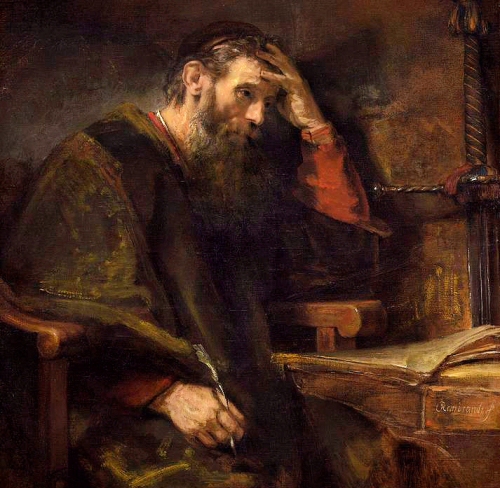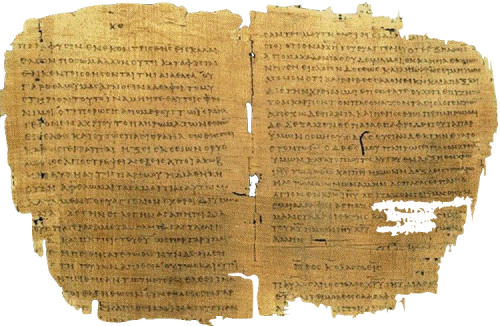“The Apostle Paul,” by Rembrandt van Rijn
 Many times I heard it said that in the early days of the Christian church, it was of one accord, sharing all things in common, united by the Holy Spirit. Certainly this is the view of the church we get from the Book of Acts, which emphasizes the theme of unity through the Holy Spirit:
Many times I heard it said that in the early days of the Christian church, it was of one accord, sharing all things in common, united by the Holy Spirit. Certainly this is the view of the church we get from the Book of Acts, which emphasizes the theme of unity through the Holy Spirit:
And they, continuing daily with one accord in the temple, and breaking bread from house to house, did eat their meat with gladness and singleness of heart, Praising God, and having favour with all the people. (Acts 2:46-47; KJV)
But from Paul’s letters we get a different viewpoint, in which factions and sometimes angry discord can be seen.
In Paul’s letter to the Galatians he speaks of a public argument between himself and Peter over the question of whether Jewish Christians were allowed to eat at the same table with Gentile Christians. And in the letter to the Corinthians, he speaks of factions centered on different leaders.
Now I appeal to you, brothers and sisters, by the name of our Lord Jesus Christ, that all of you be in agreement and that there be no divisions among you, but that you be united in the same mind and the same purpose. For it has been reported to me by Chloe’s people that there are quarrels among you. (I Cor. 1:10-11)
“What I mean,” Paul explains, “is that each of you says, ‘I belong to Paul,’ or ‘I belong to Apollos,’ or ‘I belong to Cephas,’ or ‘I belong to Christ.’” We don’t know a lot about these factions, but we can deduce some things that may interesting.
Peter
Peter, of course, is traditionally known as the chief disciple of Jesus, the one whom Jesus appointed to be the head of the church. But as already mentioned, Peter and Paul fought about whether Jews and Gentiles could eat together.
Was this also a question at Corinth? Paul was the first apostle to preach at Corinth and is thought to be the founder of the Corinthian church. Perhaps those who claimed Peter as their leader believed that that Gentiles shouldn’t mix with Jews, or even that Gentiles should convert to Judaism to become full members of the church. Or, to put a kinder face on it, perhaps it was just that some members of the Corinthian church were converted by Peter’s preaching and were boasting of this, because having Peter as their spiritual father made them feel superior to others.
Apollos
But what of those who said, “I belong to Apollos?” Not much is known of this evangelist, but the Book of Acts refers to him as active in the city of Ephesus. He was “a Jew, a native of Alexandria. He was an eloquent man, well-versed in the scriptures. He had been instructed in the Way of the Lord; and he spoke with burning enthusiasm and taught accurately the things concerning Jesus, though he knew only the baptism of John” (Acts 18). Paul said, “I planted, Apollos watered, but God gave the growth.” This refers to the fact that Paul was the first evangelist to come to Corinth, but Apollos came soon after and apparently was quite successful in bringing in new members to the Corinthian church. But were there theological differences between Paul and Apollos, as there apparently were between Paul and Peter? The Book of Acts hints that Paul’s ministry emphasized the Holy Spirit more than Apollos’ did. It states, “When Paul came to Ephesus, he found some disciples and said to them, “Did you receive the Holy Spirit when you became believers?” They replied, “No, we have not even heard that there is a Holy Spirit.” Thus it is likely that the Holy Spirit was a more important factor in Paul’s tradition than in the tradition of Apollos.
Tongues
This gives us a possible insight into another thing that was dividing the Corinthian church – the controversy over speaking in tongues and the gifts of the spirit. According to Paul’s letter, those who spoke in tongues sometimes used this gift arrogantly, disrupting church meetings and making a bad impression on new guests. It got to the point that Paul said, “I would rather speak five intelligible words to instruct others than ten thousand words in a tongue… if the whole church comes together and everyone speaks in tongues, and inquirers or unbelievers come in, will they not say that you are out of your mind?” (I Cor. 14)
This is the problem that prompted Paul’s most memorable chapter, the famous one on love (I Cor. 13), in which he says, “If I speak with the tongues of men and angels, and have not love, I am a noisy gong or a clanging cymbal.” He goes on to explain that speaking in tongues ranks relatively low among the gifts of the Spirit, and encourages the Corinthians to “seek first the higher gifts,” such as prophecy. He closed that chapter with the blessing, “Now hope, faith and love abide; but the greatest of these is love.”
Scripture
As time went on, another issue that divided the church was the question of which scriptures were legitimate and which were not. II Timothy 3:16 says, “All scripture is inspired by God and is useful for teaching, for reproof, for correction, and for training in righteousness.” But what scripture is the author of this letter talking about? There was no New Testament as we know it at that time. In Paul’s day, the gospels had not yet been written, and even the Old Testament was not yet formed into a definite canon as we have today.
In fact, there was considerable debate about the question of scripture. In the mid-second century a teacher named Marcion arose in Rome and became influential both in the Roman church and Asia Minor. He was the first to propose a definite list of authorized scriptures. His bible consisted of an edited version of the Gospel of Luke and six letters of Paul. Not only did he omit the other Gospels and letters of the New Testament, he rejected the Old Testament completely. Marcion went so far as to say that the vengeful God of the Old Testament was a different being entirely from the Heavenly Father who inspired Jesus Christ. This prompted the orthodox Church to decide once and for all that the Old Testament God and the Heavenly Father were the same being, and that the Old Testament was indeed holy scripture.
The Muratorian Canon
Authors whose writings survived soon began discussing which scriptures they considered valid. The Muratorian Canon is a list from the late first century that is more inclusive than Marcion’s in which we can see the New Testament that we know beginning to take shape. It includes Four Gospels, The Book of Acts and 13 Epistles of Paul. Hebrews is notably not included. The Epistles of Jude and John are included, but the Epistles of Peter and James are not. The Book of Revelation is also included. Interestingly, Muratorian canon accepts three books that were later rejected: the Apocalypse of Peter, the Wisdom of Solomon, and the Shepherd of Hermas (accepted to be read in church but not considered apostolic).
However, it would not be until the fourth century that the New Testament took final form. Many people have wrongly believed this happened at the Council of Nicaea, but this is not the case. The first complete list was published in 376 C.E. by Bishop Athanasius of Alexandria. Even after this, however, some churches accepted books that are now omitted – for example the Epistle of Barnabas, the Gospel of Peter and the Shepherd of Hermas, while others rejected books that are now included – such as the Book of Revelation and Epistle of James. In fact, it would not be until the Council of Trent in 1546 that the Catholic Church formally adopted the current list, and even today Catholic Bibles include the Old Testament Apocrypha, which most Protestant Bibles omit.
From this we can see that it took a very long time for the question of Scripture to be settled.
A fragment of an early Greek New Testament manuscript.
The Eight Great Textbooks
So what does this have to do with Unificationists? One advantage we have over the early Christian Church is that Reverend Sun Myung Moon himself left us a list of authorized texts, the “Eight Great Textbooks”:
- The Sermons of the Rev. Sun Myung Moon (1,200 volumes)
- Exposition of the Divine Principle
- Cheon Seong Gyeong (Selections from Speeches of True Parents)
- The Peace Messages
- Family Pledge
- True Families: The Gateway to Heaven
- Owner of Peace, Owner of Lineage
- World Scripture
In addition, Rev. Moon said that his autobiography, As a Peace-Loving Global Citizen, has equal standing with the Eight Great Textbooks. Of course, Unificationists are not prohibited from reading other scriptures in church as well.
Nevertheless, today we have a major controversy brewing over which version of a collection of Rev. Moon’s words is legitimate: the first edition of the Cheon Seong Gyeong (2006), or the revised edition published last year. Some argue that Rev Moon said, “Don’t touch the CSG,” while others point to speeches in which he authorized additional volumes and expressed his intention to reduce the original version to a more manageable length:
The first and second sorting process have been conducted. It consists of around 2,300 pages. Look at the huge amount of pages. I will work on reducing it myself, complete it before I die and mark it with a seal (Collected Sermons, Vol. 434 -128, Jan. 30, 2004)
So the question becomes, was Mrs. Moon authorized to complete this work that Rev. Moon intended to complete before he died? He said things like, “If I ascend to the spirit world, True Mother can take over my role” and “the True Parents have achieved ultimate unity.” But still the controversy is not resolved.
Whatever one believes, I think Paul’s admonition is well worth keeping in mind: “If I speak with the tongues of men and angels, but have not love, I am a noisy cymbal or a clanging gong.” Even more to the point is Jesus’ commandment to love not only your brothers, but even your enemies. It is easy to talk about loving your enemy theoretically, but the closer the enemy is to your heart, the harder it is to practice what Jesus taught. Rev. Moon went so far as to say we must even love the “enemy of love” who destroys our own family.
Jesus’ final instruction to his disciples as recorded in the Gospel of John was:
I give you a new commandment, that you love one another. Just as I have loved you, you also should love one another. By this everyone will know that you are my disciples, if you have love for one another. (John 13:34-35)
No matter how intense the debate is, or how heated the discussion, let’s remember to keep love in our hearts even for those who disagree with us. If we do this, we will succeed where the early Christian church failed, and the future will be bright.
This article is adapted from a sermon the author gave on March 15, 2015 at the Northern Virginia Family Church.
Dan Fefferman (UTS Class of 1986) is President of the International Coalition for Religious Freedom in Washington, DC, and a member of the UTS Board of Trustees. He is also the author of many of the Unification Movement’s best-loved songs. More than 100 of his compositions can be found on SoundCloud.com.



Thank you, Dan, for sharing with us this historical perspective. This gives me renewed respect for the early Christians and deeper appreciation for Paul’s heartfelt advice that love is the most important.
We need this reminder at this time, because division, accusation and all that comes with the insistence of being right, of being “true” at the expense of being kind and loving, will split the church community. It will build walls among those who so strongly were urging other denominations to “break down the walls.”
This is not as easy to put in practice when there are various perspectives. Love is going beyond perspectives, in the realm of the heart. This is the only place where unity can be found.
Thank you, Dan. It is good to learn from what has gone on before.
In addition to differences related to scriptural texts, there were also divisions related to rituals. Particularly, Paul struggled over the issue of Jewish circumcision and dietary rules in the Greek lands where he worked. The book of Galatians mentions these problems. Can you imagine having a wealthy Greek convert able to help fund your church, but then ask him to be circumcised in the prime of his life, with 50 or more people’s livelihood depending on his business, and a possibility of getting an infection and dying? It would be considered dereliction of personal responsibility. Yet, James insisted Paul had to remain true to Jewish ritual if he was to be considered a legitimate church leader. Peter tried to moderate on Paul’s behalf and James had almost conceded, but at the last moment legalism prevailed and Paul was forced to break with the Jerusalem church that he had served and raised money for. You can almost feel his broken heart, feeling the Jerusalem church was more about legalism than love.
Gordon, I take your basic point but disagree with the historical details. I don’t see where you get the idea that Paul broke with the Jerusalem church. It’s true that he had a public quarrel with Paul but this was early in his ministry, and it was not about circumcision. His fundraising for the Jerusalem church came later and is an indication that he did not intend a permanent break, even assuming there ever was one. Certainly the account in Acts [which admittedly downplays division] indicates that James did not insist on circumcision for gentile Christians, and I see nothing in Paul’s letters to the contrary.
The issue over which Paul and Peter argued was not whether gentiles had to convert to Judaism [on which Paul, Peter and James all seem to say “no”] but whether Jewish Christians who kept kosher should or should not eat with gentile Christians. In the larger Jewish community such issues were also controversial, with the followers of Rabbi Hillel taking the liberal view that Jews should engage in commerce with gentiles and the followers of Rabbi Shammai taking the opposite view. Paul was rightly upset by Peter’s refusal to eat with gentiles [after the “men from James” arrived at Antioch] but was he right to “oppose him to his face?” I don’t know. What I do believe, however, is that Paul did not always “love his enemies” in the church, saying for example of those who did insist on circumcision: “I wish the people who are bothering you would castrate themselves!” [Gal 5.13] In my opinion this is a good example of the attitude we should avoid. Instead we have to find the strength to practice the “new commandment” of Jesus, to “love one another” instead, even when our hearts feel broken and betrayed.
Dan,
The point I was making was based on Christ’s Ventriloquists by Eric Zeusse. Paragon House had contracted the book, but it eventually had to cancel publication. Nevertheless, he made a strong case for the position I described above.
Sunrise Films has been airing a series on Early Christianity this past week before Easter. Narrated by Jonathan Phillips from the University of London, he tells the stories of the disciples, the early Apostles and Christian leaders in their various contexts. The photography and discussion of the difficult conflicts both within and around these communities are presented in a visual storytelling that can capture the interests of those perhaps unmotivated to read scholarly texts, commentaries or even the Bible itself. Having seen these documentaries, one can then become more motivated to go back to the Bible and the historic sources.
As Dan indicates, reading Paul’s Letter to the Corinthians can be a source of understanding and healing for the schisms of today’s church.
In my Bible study a couple of years back, Lloyd Eby was struck by the fact that I Corinthians 13 seems very different from Paul’s usual writing. He suggested it may have been inserted by a later editor. I saw recently that professor Bart Erhman has had a similar thought, further suggesting that Paul might have been quoting a poem or hymn, as he apparently did elsewhere, although these are relatively short. Would Paul really say that “the greatest of these [hope, faith, love] is love?” It seems to me that for Paul, everything revolved around faith in Christ’s atoning death and resurrection. He might indeed agree that a misdirected faith is a merely a clanging gong — but faith in Christ, for him, is essential, while works of the law, even loving works, avail us nothing without faith.